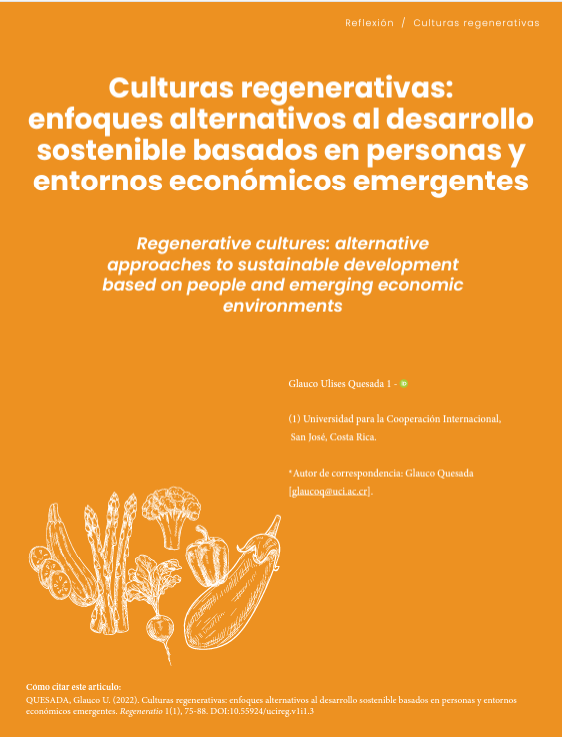Culturas regenerativas
enfoques alternativos al desarrollo sostenible basados en personas y entornos económicos emergentes
DOI:
https://doi.org/10.55924/ucireg.v1i1.3Palabras clave:
desarrollo regenerativo, desarrollo sostenible, complejidad, pensamiento sistémico, nuevas economías, economías solidariasResumen
La presente reflexión establece un puente entre el paradigma del desarrollo sostenible, con la emergente conceptualización del desarrollo regenerativo, para analizar tendencias, retos y dilemas sociales, ambientales y económicos confrontados por las sociedades modernas, amparadas a un desarrollo científico prolífico en hallazgos y desarrollo tecnológico; pero que no es ni promotor de mayor equidad; ni es suficiente para abordar las complejidades derivadas, ni para suplir los recursos necesarios para sostener los niveles de consumo potenciados por la globalización y el libre comercio fomentan. El análisis pretende recomendar enfoques alternativos para recuperar el valor de la dimensión humana sistémica, armónica y simbiótica con la naturaleza, ante el reto de los entornos económicos emergentes.
Citas
Capra, F and Luisi, P. (2018) The Systems View of Life (A Unifying Vision). Cambridge University Press. Kindle Edition.
Duflo, Esther; Banerjee, Abhijit (2020). Buena economía para tiempos difíciles. Edición de Kindle.
Davis, B and Sumara, D. (2008) Complexity and Education: Inquiries into learning, teaching and research [Kindle] Retrieved from amazon.com.
Doughnut Economics Action Lab (2020). Doughnut Principles of Practice. Available at https://doughnuteconomics.org/tools-and-stories/23
Global Footprint Network. (2014). August 19th is Earth Overshoot Day: The date our Ecological Footprint exceeds our planet’s annual budget. Obtenido de Earth Overshoot Day: http://www.footprintnetwork.org/images/article_uploads/EarthOvershootDay_2014_PR_General.pdf
ICRC (International Committee of Red Cross). (2020). They didn't start the fire: Millennial views on war and peace. https://www.icrc.org/en/millennials-on-war
Kuhn, T. (2008) La estructura de las revoluciones científicas. [KINDLE] Recuperado de amazon.com
Morseletto, P. (2020). Restorative and regenerative: Exploring the concepts in the circular economy. Journal of Industrial Ecology, 24 (4), 763–773. https://doi.org/10.1111/jiec.12987
Najmanovich, D (2005). El juego de los vínculos. Subjetividad y red social: Figuras en mutación. Buenos Aires: Editorial Biblos.
Najmanovich, D (2008). Mirar con nuevos ojos: Nuevos paradigmas en la ciencia y el pensamiento complejo. Buenos Aires: Editorial Biblos.
Mecklin, J. (ed.) (2022). At doom’s doorstep: it is 100 seconds to midnight. Science and Security Board Bulletin of the Atomic Scientists (2022). https://thebulletin.org/wp-content/uploads/2022/01/2022-doomsday-clock-statement.pdf
Müller, E. (2018) Regenerative Development in Higher Education: Costa Rica’s
Perspective. Higher Education in the Era of the Fourth Industrial Revolution. Nancy W. Gleason (Editor). Singapore: Palgrave Macmillan.
Raworth, K. (2015) A safe and just space for humanity. Can we live within the doughnut? Available at https://www-cdn.oxfam.org/s3fs-public/file_attachments/dp-a-safe-and-just-space-for-humanity-130212-en_5.pdf
Robinson, K. (2010). Bring on the learning revolution! [Video]. Obtenido de TED Ideas worth spreading: √https://www.ted.com/talks/sir_ken_robinson_bring_on_the_revolution.
Salas, J. (24.01.2020) Los científicos adelantan el reloj del apocalipsis: quedan cien segundos para el fin del mundo. Diario El País. https://elpais.com/elpais/2020/01/23/ciencia/1579777464_692402.html
Satell, (2016). Like It or not, Complexity Is something we can no longer ignore. Available at https://www.forbes.com/sites/gregsatell/2016/09/09/like-it-or-not-complexity-is-something-we-can-no-longer-ignore/#71e0b9e9f57e
Steffen, W., Richardson, K., Rockström, J., Cornell, S., Fetzer, Bennett, E., Biggs, R., Carpenter, S., Cynthia, Folke, F., Gerten, D., Heinke, J., Mace, G., Persson, L., Ramanathan, V., Reyers, B., Sörlin, S. (13 February 2015). Planetary boundaries: Guiding human development on a changing planet. In Science 347(6223). DOI: 10.1126/science.1259855
Stoknes, P. (2021) Tomorrow’s economy: a guide to creating healthy green growth MIT Press: Cambridge. Edición de Kindle.
Vitousek, P., Mooney, H., Lubchenco, J. y Melillo, J. (25 Jul 1997). Human Domination of Earth’s Ecosystems. Science, 277(5325), 494-499. http://dx.doi.org/10.1126/science.277.5325.494
Wahl, Daniel. (2017). Designing Regenerative Cultures (Posición en Kindle17-19). Triarchy Press. Retrieved for Amazon.
World Economic Forum. (2021). The Global Risks Report 2021Available at http://reports.weforum.org/global-risks-2021/

Archivos adicionales
Publicado
Cómo citar
Número
Sección
Categorías
Licencia
Derechos de autor 2022 Glauco Ulises Quesada Ramírez

Esta obra está bajo una licencia internacional Creative Commons Atribución-NoComercial-CompartirIgual 4.0.
Las contribuciones a la revista se realizan al amparo de las condiciones de la licencia CREATIVE COMMOMS – Atribución - No Comercial - Sin Derivadas 4.0 Internacional (CC BY-NC-ND 4.0).
La utilización de este tipo de licencia brinda a un usuario la autorización de compartir — copiar y redistribuir el material en cualquier medio o formato, en la medida en que:
- Brinde atribución o reconocimiento de manera adecuada al autor(a) o autores(as) del material licenciado y de cualquier otra persona designada para recibir atribución o reconocimiento, de cualquier manera, razonable, solicitada por el Licenciante.
- Brindar un enlace a la licencia, e indicar si se han realizado cambios. Puede hacerlo en cualquier forma razonable, pero no de tal forma que sugiera que usted o su uso tienen el apoyo de la persona licenciante.
- No haga uso del material con propósitos comerciales.
- No modifique el contenido original del material. Si remezcla, transforma o crea a partir del material, no podrá distribuir el material modificado.






